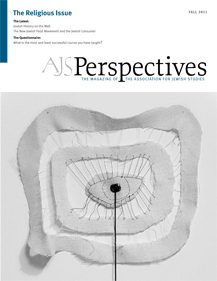Dear Colleagues,
When I first attended the AJS annual meetings as a graduate student in the mid-1970s, I could never have imagined that I would one day be president of that learned society. After all, the president of the AJS was a distinguished scholar, a major figure in the world of Jewish Studies, a person lauded for his (and later her) brilliance, insight, erudition. True, the AJS had been created by younger scholars upset with the American Academy for Jewish Research, whose mostly elderly members treated Jewish Studies as an "old boys' club" of professors at Columbia, Harvard, the Jewish Theological Seminary, and Hebrew Union College. The early presidents of AJS were young, energetic, and eager to place Jewish Studies on the academic map of North America. Yet we graduate students rightly regarded them as the leaders and we defined the cutting edge of Jewish Studies by scholarship on the Bible, rabbinics, Jewish history, and Hebrew and Yiddish literature.
I am still in awe of those men and women, most of whom are still productive scholars even in retirement. They wrote interesting and important books that many of us read even when they were far from our own fields of research. They provided us with role models of dispassionate scholarship, commitment to the highest standards of the academy, and confidence that the study of the Jews and Jewish culture was not a parochial concern but an integral part of a liberal arts curriculum. They paved the way for the entry of Jewish Studies into a wide array of universities, making it possible for the rest of us to find our places there. In the early twenty-first century, most major universities have significant Jewish Studies programs, whose faculty continue the scholarly traditions of the field.
Why did I hold these scholars in such awe? Was it their mastery of traditional Jewish texts? Was it their command of many languages? Was it their scholarly brilliance? I am sure it was all of the above, combined with a good dose of graduate student insecurity about my own abilities. To be sure, I was well-trained in Jewish history at Columbia, required to master all of it from antiquity to the present, and I had successfully learned the craft of the historian. But could I be like the great scholars whose papers I heard at the AJS and whose books I read? Did the fact that I did not use traditional, Hebrew language sources in my own work but rather an array of Jewish and non-Jewish sources— all in German—preclude me from being one of the masters of Jewish Studies? To be sure, I considered myself an insider, and I hoped that the masters would accept me as one.
The field of Jewish Studies today has changed significantly since I was a graduate student. Scholars still study classical texts, and the traditional fields continue to flourish. What has changed is that many nontraditional fields—the Social Sciences, Cultural Studies, Gender Studies, Media Studies, Israel Studies—have come to be included in Jewish Studies, and many scholars in those fields have not received what was once considered the traditional training in Jewish Studies, which included a mastery of the classical Jewish texts and deep knowledge of the classical Jewish languages. The lack of traditional training raises eyebrows in some circles. Some wonder whether these new fields are "really" in Jewish Studies. My answer is simple: Of course they are in Jewish Studies. Anyone who studies Jews and Jewish culture is included in Jewish Studies. For some periods—especially antiquity, the Middle Ages, and the early modern period—mastery of traditional Jewish languages and sources is essential; for other periods it is less crucial. Personally I am a fan of maximal training. I think we should all learn many languages, especially Hebrew, and I think familiarity with traditional Jewish texts is a good background for everyone. Nevertheless, I am delighted that Jewish Studies has expanded beyond the traditional fields into new arenas. These new arenas not only enrich Jewish Studies generally and make the conference lively and interesting, but they also alert those of us in the traditional fields about new trends in scholarship, new ways of looking at old subjects, and new areas to explore.
I feel deeply honored that I have been able to serve as president of the Association for Jewish Studies these past two years. I hope that I have followed in the footsteps of my predecessors. I hope that, like them, I have served as a model of good scholarship, commitment to the highest standards of academic rigor, and devotion to Jewish Studies, which young scholars will continue to emulate. I hope that I have adequately represented the interests of Jewish Studies in the academy. Finally, I hope that my predecessors, all of whom had wide-ranging visions, would approve of the new directions that Jewish Studies in general and the AJS in particular have undertaken on my watch.
Marsha Rozenblit
University of Maryland

